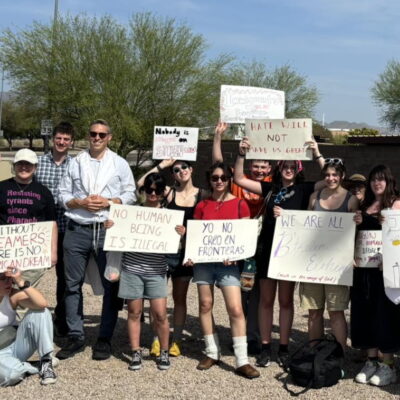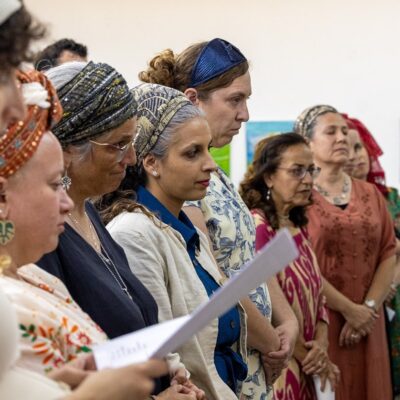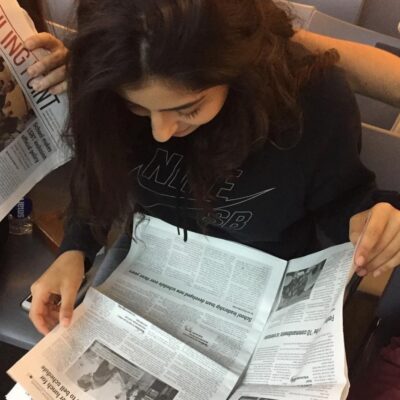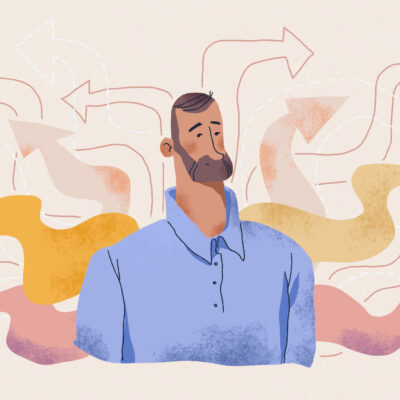How Philanthropy Can Strengthen Peoplehood in Polarized Times

[This essay is from The Peoplehood Papers, volume 27 – “Philanthropy and Jewish Peoplehood” – published by the Center for Jewish Peoplehood Education.]
By Andrés Spokoiny
There has always been an inextricable link between philanthropy and Jewish peoplehood. One of the first projects the Jewish people embark on after the Exodus is building the mishkan, the portable sanctuary in the desert, using the voluntary contributions of individual Israelites “from the generosity of their hearts.” Philanthropy is also a way of expressing our interconnectedness: One is supposed to give to the poor because they are “achicha” (your brother), and the well-known principle of “kol Israel arevim ze baze” (Jews are responsible for one another) gets expressed mainly through philanthropy, generosity and justice.
Naturally, the word “philanthropy” doesn’t appear in the Bible, but the action of giving is intrinsic to what makes us a people: a shared project and a network of internal solidarity towards one another. Philanthropy is not an addition, or a post-datum to our peoplehood idea; not an afterthought that came to correct some mistakes in the original design but a critical feature of how we understand “the art of being a people.”
In the Diasporic experience – including the American Jewish community – philanthropy was the bedrock of the community. Giving, especially in America, became a bond that contributed to a sense of shared destiny; or being part of the same people. When religious practices became less prevalent, philanthropic rituals took over. Even for those who did not keep kosher or go to synagogue, the attachment to the Jewish People could be expressed through a philanthropic engagement. Philanthropy became both an identity building experience but also a substitute for other, more time-consuming ways, of expressing one’s identity.
But the individualism of the last few decades have upended this traditional view of philanthropy, and therefore, the relationship between philanthropy and peoplehood.
The 21st century is a time of hyper-empowered individuals, and any attachment to a collective is seen and felt as a restriction of one’s freedom and power. Individuals are not expected to submit themselves to a collective social project; rather the opposite, the main role of society is to guarantee the empowerment and the expression of all the individual’s potential. Furthermore, the blurring of identity boundaries makes the ancient definition of “people” complicated to start with – more difficult. Who is today “my people”? Is there such a thing, or am I just a member of human race, with solidarity towards all?
In this world of hyper-empowered individuals, philanthropy ceases being a collective endeavor to and is instead a tool that the individual uses to express herself, to ”leave a unique mark” or to “change the world.”
It’s no surprise then that individual or private philanthropy grows geometrically while communal philanthropy is stagnant. Communal philanthropy has a very difficult task: convince people to restrict their own individual freedom on behalf of a shared project.
Individualism, and its impact on both identity and philanthropy, creates a vicious cycle: the less we feel part of a people, the less we are motivated to donate collectively with our communal institutions. And since donating collectively enhances our feeling of belonging and peoplehood, less communal giving means less feeling part of a people.
So, what can funders that care about peoplehood do about this state of affairs?
First, there’s a mental shift that is necessary. Private and communal philanthropy don’t need to be seen as adversarial, nor as a “zero sum game.” In fact, individual expression and collective good don’t need to be mutually exclusive. Individual philanthropy can add important dimensions to the communal experience, through entrepreneurship, risk-taking and flexibility for innovation. Conversely, communal philanthropy ensures that core needs are met and frees up individual funders to focus on their innovative pursuits.
Part of that mental shift has to do with a willingness to compromise. In a paradoxical way, the individual needs to submit itself to the collective in some ways, so as to gain the benefits of the collective. You need to restrict your freedom in order to be part of a nation-state, but that nation state also guarantees your freedom and your prosperity. You can’t have freedom and prosperity without making some individual sacrifice. It’s important to understand that, by definition, we can’t fully control a collective project, but that, in aggregate we gain more than we lose from it.
Second, philanthropy can take an active role in promoting activities that strengthen a sense of peoplehood; programs like Birthright may not be perfect, but they do cultivate a sense of collectivity.
Third, we are living in highly polarized times, which is further fraying the fabric of peoplehood. Funders have an enormous role to play in this area. On the one hand, they need to provide funds for dialogue and encounter between Jews of different ideological persuasions; on the other, they need to stop funding organizations that promote division and incivility. There is today a philanthropically funded “rage machine” that demonizes other Jews. That is obviously antithetical to the idea of peoplehood. In a people you take everybody, not just the small sects with whom you agree.
In these times of polarization funders need to support initiatives that seek to provide forums where different ideas are debated, instead of the ideologically homogeneous echo-chambers that are currently attracting the most funding. It may sound counter-intuitive for a funder to fund, for example, a pluralistic Jewish media outlet that includes pieces he profoundly disagrees with, but for the Jewish people to remain a collective project, instead of a patchwork of sects, it’s critical to have these places of open debate.
Funders can and should especially invest in forums for dialogue and exchange concerning Israel and Israel-Diaspora relations. In the political arena, where much of these issues are played out, short-termism and political gain will always prevail; but funders can influence the civil society in many ways. Through philanthropic partnerships, Israeli and Diaspora funders can also be the example and role model of a different paradigm in the relation between the two poles of Jewish life; one based on mutual respect, shared learning and equality. Funders need to be aware of the social influence they command, which goes well beyond their funding capacity. They can foster peoplehood through their own behavior; through the programs they fund and defund and through a mental model that understand that the collective and the individual are two sides of the same coin.
Andrés Spokoiny is president and CEO of Jewish Funders Network, a community that grows the size and impact of Jewish philanthropy. Before joining JFN in 2012, he served as the CEO of Federation CJA in Montreal and, prior to that, was regional director for Northeast Europe for the American Jewish Joint Distribution Community (JDC).
eJewish Philanthropy is the exclusive digital publisher of the individual Peoplehood Papers essays.













